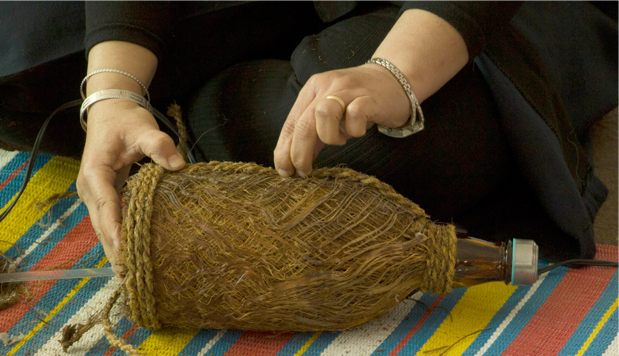Zahra, Maryam e Mahdieh grew up among date palms orchards. They know every secret of the date fruits, when to harvest, how to recognize the best ones, how to handle them without ruining their pulp. In the village of Bach Chamak, in the neighborhood of Bam, the oasis-city in the middle of the desert in the south east of Iran, almost each family has his own date palm orchard and derives from it at least part of its livelihood.
In the rural areas of Iran, there are not many opportunities for economic and social emancipation of young women. For this reason, Zahra, Maryam and Mahdieh, together with around 20 other women of the surrounding villages, decided to build on their traditional knowledge to start up their entrepreneurial idea. Since generations, their families hand down receipts based on the fruits of the palms: energizing drinks produced with the palm pollen, vinegars of different consistencies from date maceration to season meats or salads, or even pickles from unripe dates fallen during pruning.
The idea of a women cooperative was born during one of the activities of the project SPRING, which Haliéus is implementing with the local ngo SPASDI, co-funded by the European union and aimed at strengthening the rural cooperatives of the Province of Bam. In fact, the women started to develop the entrepreneurial idea at the occasion of a think-tank organized by the project for involving smallholder farmers, women and youth in a participatory mechanism of consultation for the sustainable development of the territory.
Rural women, normally marginalized in the village decision making process, engaged in the dialogue in a very proactive way, increasing their self-confidence and finally they had the opportunity to become protagonist of the development of the local economy. The project then supported them with tailored capacity building on business Planning, cooperative management, as well as production and marketing techniques.
The most successful product – according to the first market tests in local fairs and in Iran – is the traditional date vinegar.
Widely used in the Middle East, today we know, thanks to ancient Babylonian texts, that date vinegar has been produced for more than 3000 years in the Middle East. Made from the syrup of pressed and processed dates, or the sap of the palms, date vinegar was widely used as cooking and more importantly as a preservative in the hot climate.
The women of the new cooperative have also started to use date palm fibers to package their products. In this business model, women participation is not limited to a specific season as in the past. So that they can improve and stabilize their livelihood and income throughout the year.

The production follows the traditional receipts, while adopting modern techniques compliant with the level of the European standards of quality and food safety.
“Making date vinegar can help our livelihood. last year`s vinegar was sold during Nowruz. At this stage, fairs represent an occasion to start selling and launching our products.” these are the words of Mandana, an entrepreneur from Bamsaid, who emphasizes how the cooperative is now working on the marketing process. Ameneh, a farmer from Amirabad village, said, “We did not know anything about the date’s value chain. SPRING opened our mind on the importance of packaging and branding. We spent almost 10 sessions in class and we learned a lot”.
Changing the cultivation pattern, diversifying the products, and creating and developing of side industries and processing are among essential strategies for agriculture to exit the sole cropping system, which is producing low returns and high risks. The citizens of Bam, initially skeptic about a cooperativesl often misperceived as inefficient government-led entities, are now looking at cooperative model for the creation of new approaches to business, where citizens can lead the change of the socio-economic patterns through their aggregation in cooperatives. These are the elements that lead us to wish good luck to the women’s cooperative in Bam for this new adventure



